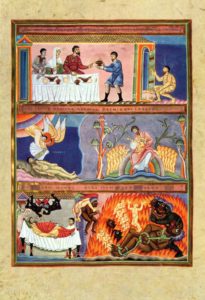Dives and Lazarus
Mount Calvary Church
A Roman Catholic Parish
The Personal Ordinariate of S. Peter
Eutaw Street and Madison Avenue
Baltimore, Maryland
Trinity XV
Rev. Albert Scharbach, Pastor
Dr. Allen Buskirk, Choirmaster
Midori Ataka, Organist
Sunday, September 29, 2019
8:00 A.M. Said Mass
10:00 A.M. Sung Mass
Brunch to follow in the undercroft
_______________
Prelude
Fantasia, by Johann Krieger
Postlude
Duo, by Jean-Adam Guilain
_______________
Common
Missa S. Maria Magdalena, Healey Willan
_______________
Anthems
Dives and Lazarus, Traditional English Carol
1. As it fell out upon a day, rich Diverus made a feast, and he invited all his friends, and gentry of the best. 2. Then Lazarus laid him down and down and down at Diverus’ door: some meat and drink, brother, Diverus, bestow upon the poor. 3. Thou’rt none of my brothers, Lazarus, that lies begging at my door; nor meat, nor drink will I give to thee, nor bestow upon the poor. 4. As it fell out upon a day, poor Lazarus sickened and died; there came two angels out of Heaven, his soul therein to guide. 5. Rise up! rise up! brother Lazarus, and come along with me; there’s a place in heaven prepared for thee to sit on an angel’s knee. 6. As it fell out upon a day, rich Diverus sickened and died; there came two serpents out of hell, his soul therein to guide. 7. Rise up! rise up! brother Diverus, and come along with me; there’s a place in hell prepared for thee to sit on a serpent’s knee. 8. Then Diverus looked with burning eyes and saw poor Lazarus blest; one drop of water Lazarus, to quench my flaming thirst. 9. O, had I as many years to abide as there are blades of grass, then there would be an end, but now hell’s pains will never pass.
__________
FESTAL SONG written in 1894 by American composer and organist, William Henry Walter (1825-1893).
Draw us in the Spirit’s tether was written by Anglican Percy Dearmer (1867—1936). Objections have been raised to its seemingly low Eucharistic theology, but it has been used at papal ceremonies, and the melody is lovely. Jesus has promised that he will be present when we gather in His name, and indeed the purpose of our receiving Him in the Eucharist is to become one body with Him, and our love and service is sign to the world of His presence. The hymn begins in the Upper Room with the disciples and comes full circle as we join them and the Christians of every age around the table and are nourished to serve others in the world.
John Roberts, in Welsh Ieuan Gwyllt (1822-1877), composed the tune ST. DENIO (also known as JOANNA, or PALESTINA). It is derived from a Welsh folk song Can Mlynned i ‘nawr’ (“A Hundred Years from Now”).
